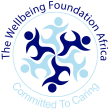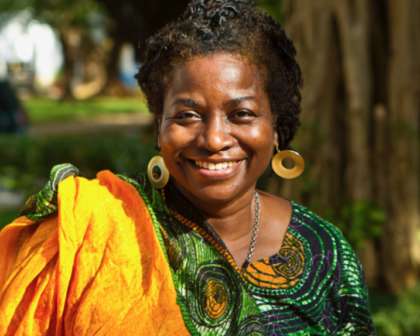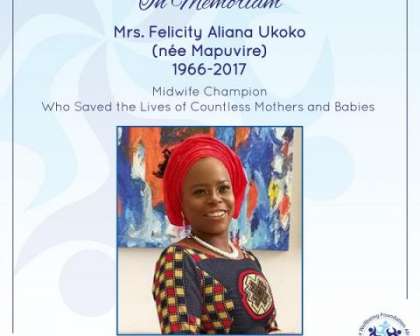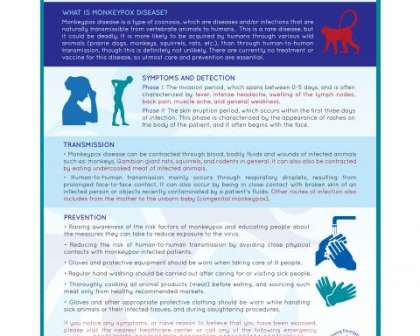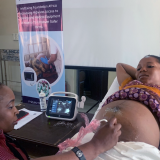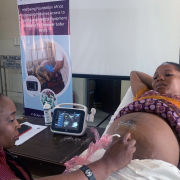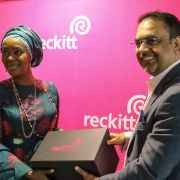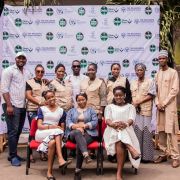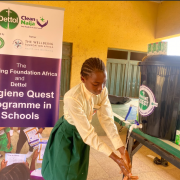The Wellbeing Foundation Africa’s Global and National Policy Call for World Breastfeeding Week 2017
Breast milk is the baby’s natural food, easily digested, and containing all the nutrients the baby requires for the first six months. It reduces the risk of infections and poor growth, and it is also a perfect way to bond with the baby. Breastfeeding is good for the mother, too; it lowers the risk of developing breast and ovarian cancer. Mothers who breastfeed find it easier to lose the weight gained during pregnancy.
The importance of breastfeeding in preventing deaths of children in low- and middle-income countries (LMICs) is well recognised and documented. Scaling up breastfeeding could annually prevent approximately 800,000 deaths of children under the age of 5 years. In Nigeria alone, 98% of new mothers initiate breastfeeding; however, by six months, only 25% of them are still exclusively breastfeeding. The World Health Organization (WHO) recommends early breastfeeding initiation i.e. within the first 30 minutes following birth, and exclusive breastfeeding for the first six months of a baby’s life, in order to achieve maximum benefits, and to continue breastfeeding as part of complimentary feeding, until the baby is at least 2 years old. Research has shown that midwives are crucial and well placed to support mothers to breastfeed, thereby creating a healthy community. For example, midwives help mothers try different positions to find the one that works best. By virtue of their role in the community, midwives are accountable health professionals who work in partnership with women throughout pregnancy, birth and the postpartum period. Launched in August 2015, the MamaCare Antenatal and Postnatal Programme seeks to improve reproductive, maternal, newborn, child and adolescent health and nutrition (RMNCAH+N) outcomes. Our qualified midwife lactation counselors have reached over 6,000 women with approximately 718 weekly attendance across the 3 areas (Lagos State, Kwara State and the Federal Capital Territory, Abuja), through prenatal and postnatal contact interventions in the MamaCare continuum of care and counsel. Classes are held at various intervals: monthly, fortnightly and weekly. Each woman has had over 8 contacts with midwives during the pregnancy and postnatal period. To date, all women have made over 48 000 contacts with the midwives in the past two years, alone. One of our main focus areas is teaching mothers during pregnancy how they should breastfeed; the correct positioning; for how long; and that they should initiate breastfeeding within the first 30 minutes of giving birth. Our MamaCare midwives teach mothers how they can successfully breastfeed as with new skills, it may take some practice to get it right. Some women find breastfeeding comes very easily. Others find breastfeeding more difficult; however, with the right support from a qualified midwife, most mothers who try can breastfeed successfully. For the majority of women who do want to breastfeed, finding support when they encounter problems, such as failing to get the baby to latch on correctly, cracked/sore nipples, or returning to work can cause them to turn to formula milk, unfortunately. Our breastfeeding education programme seeks to increase the mother’s knowledge, understanding, and skills, as well as encourage them to view breastfeeding as normal and to be able to develop a positive attitude towards breastfeeding. At the Wellbeing Foundation Africa (WBFA), we also advocate globally for exclusive breastfeeding for the first 6 months, as recommended by WHO. We understand the importance of the relationship between a midwife and expectant and new mothers, and we encourage midwives to be respectful and kind to mothers. We also advocate for health workers and midwives to have the correct equipment and facilities to teach mothers about this vital, life-saving skill. This is why, this year, we are placing mothers and midwives at the center of our World Breastfeeding Week (WBW 2017) campaign, as we want to teach mothers that they can successfully breastfeed with the support of a respectful, well-trained and empathic midwife. As with all women, there are many life variants, and we will work with other international campaigns on breastfeeding to express that. As a women’s organisation, and a gender equality advocate, we want global and local breastfeeding campaigns to uplift and educate women, and not to drown them with guilt, when they cannot breastfeed. This is important within an infant and young child feeding (IYCF) continuum of care, and speaks to our current partnership with the Alive & Thrive (A&T) program, through our planned project to increase demand and uptake of early and exclusive breastfeeding in Lagos and Kaduna States of Nigeria, working with FHI360, the Bill and Melinda Gates Foundation, and McCann Global Health. With this in mind, WBFA has prepared a brief which will be released on breastfeeding on the challenges women come across whilst breastfeeding, and ways in which they can alleviate pain or discomfort. The piece also addresses a few misconceptions on breastfeeding. To tackle the critically important problem of poor nutrition among infants and young children in Nigeria, we have assembled a world-class team that is as diverse as the issue at hand. The proposed team combines expertise and experience from public and private sectors, marketing and academia, and implementers and thought leaders. Our technical approach will harness formative research to develop a communications strategy and media plan that can be executed through a range of channels, including interpersonal communications (IPC) and mass media. We will research, design, develop, implement, monitor, and document strategies, approaches, and activities, including evidence-based, creative communications, targeted at our audiences, that will overcome barriers to early and exclusive breastfeeding, improve the diets and frequency of meals in young children in the two states of Kaduna and Lagos in Nigeria, and, importantly, demonstrate that our approach is replicable and scalable across Nigeria. Our project team will be co-led by both McCann Global Health (New York/Washington, DC) and the Wellbeing Foundation Africa (Nigeria), supported by local Nigerian organizations: STB McCann (Nigeria), Silver Lining for the Needy Initiative (Nigeria), and Nigerian academic partners, including Dr. Francis Ohanyido (West African Academy of Public Health). We will also seek input from, and collaboration with, institutions and organizations that have contributed to the IYCF initiatives, including UNICEF, GAIN, Path, the Breastfeeding Innovations Working Group, and the International Confederation of Midwives (ICM). As partners of the Nigerian Breastfeeding Initiative, McCann and WBFA have been committed to finding opportunities to support behavior change programs to promote appropriate IYCF behaviors. We will be building off on Alive & Thrive’s programs in Bangladesh, Ethiopia, and Vietnam, which have also been observed through our involvement in the Breastfeeding Innovations Group. While each partner brings to this engagement, expertise in public and private sector approaches to behavior change communications, community engagement, health training, and private-public partnerships, we are equally committed to ensuring that knowledge and best practices established through Alive & Thrive are leveraged and further expanded in Nigeria. This begins with aligning closely with the Alive & Thrive framework: 1) policy/advocacy; 2) interpersonal communications and community mobilization; 3) mass communication; and 4) strategic use of data. We also acknowledge the critical need to ensure collaboration and alignment with key stakeholders, including A&T, government, NGO, and private sector partners. The Wellbeing Foundation Africa supports the Global Breastfeeding Coalition's Call To Action Priorities 1. Funding: Increase investment in programmes and policies that promote, protect and support early and exclusive breastfeeding. 2. The International Code of Marketing of Breastmilk Substitutes: Fully implement this Code, with legislation and effective enforcement, in collaboration with national food and drug regulatory agencies 3. Maternity protection in the workplace: Enact paid and sufficient family leave and workplace breastfeeding policies 4. Baby-friendly Hospital Initiative: Implement the Ten Steps to Successful Breastfeeding in maternity facilities 5. Breastfeeding counseling and training: Improve access to skilled breastfeeding counseling in healthcare facilities and community/social groups 6. Community support programmes: Encourage community-based, traditional and social networks that protect, promote, and support early and exclusive breastfeeding 7. Monitoring systems: Track progress on policies, programmes, and resource allocation.
Share this Article
